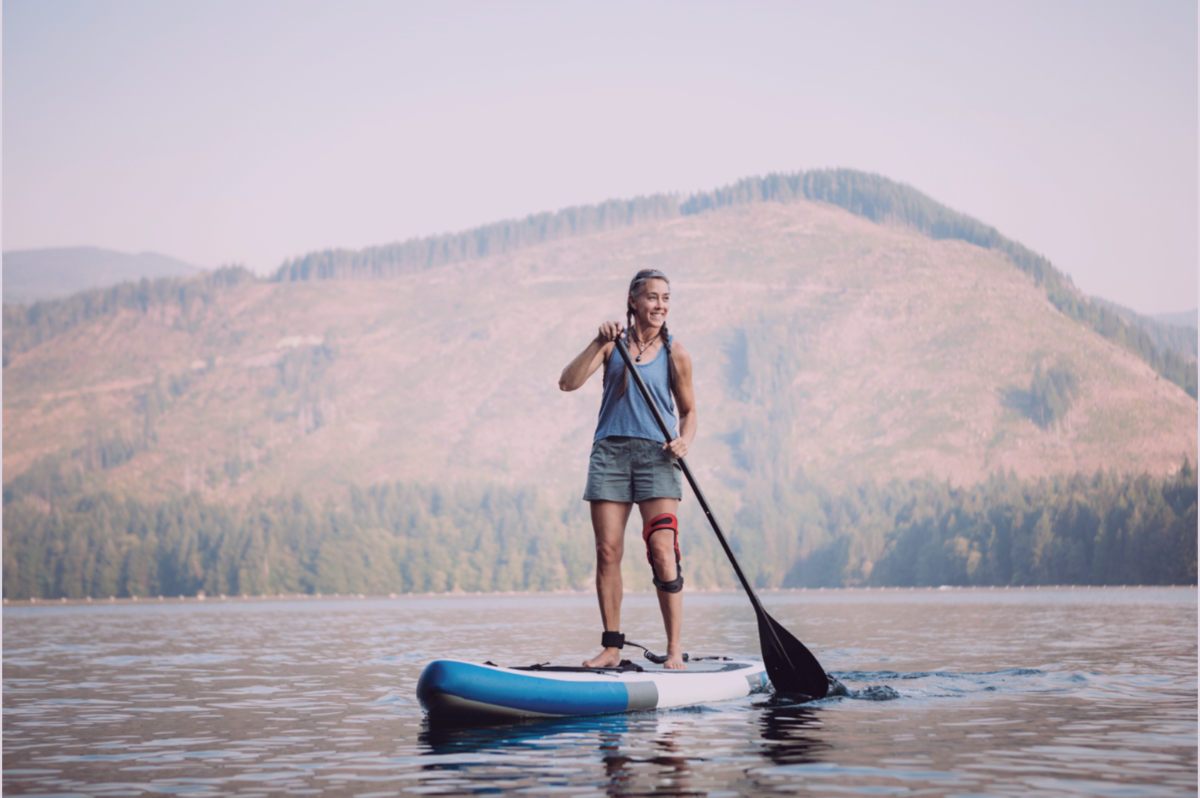Panel discusses nonoperative treatment of knee osteoarthritis
Clinical practice guidelines for knee osteoarthritis (OA) were developed and published by the American Academy of Orthopaedic Surgeons (AAOS) in 2008. The guidelines have been helpful and have stimulated discussion among physicians as some more popular treatments were considered “inconclusive” or “of poor quality evidence.”

Paddling with Evoke brace
Frank R. Kolisek MD, Moderator, Healio Orthopedics Today February 2015
The purpose of this Orthopedics Today Round Table is to solicit advice from high-volume knee physicians as to how they treat patients with knee OA in their respective practices. Drs. Beaver and Mont are orthopedic surgeons and Dr. Genin is a nonoperative sports medicine specialist, so it is interesting to see any differences in their approaches to nonoperative treatment of the OA knee. I hope this information is as useful to you as it was for me.
| Kolisek: When do you decide to use bracing in the treatment of knee OA? |
Beaver: Because of the nature of my practice, I use little bracing secondary to patients being referred for arthroplasty. I have seen multiple patients who have had unloader braces applied by other physicians who have done well and have put off knee replacement for years.
Mont: We use braces often in the treatment of knee OA. We use unloader braces for unicompartmental disease when the opposite compartment is well-preserved. We also use certain types of extension-assist braces for patients experiencing weakness or instability and to strengthen the quadriceps and hamstrings muscle groups.
With a team approach to bracing to increase patient compliance, we have had tremendous success with this group of patients who will often prefer braces to taking medications or receiving shots. Several studies have been conducted at our institution to evaluate the role of bracing in knee OA, and these have demonstrated that patients treated with the brace had greater improvements in quadriceps muscle strength, improvements in gait, activity and functional ability (demonstrated with the LEFS, KSS and SF-36 scores), and improvements in pain.
Genin: Dependent on the location of the OA, I favor both short-term and long-term usage of various bracing for knee OA. If a patient has significant vastus medialis oblique muscle quadriceps atrophy and anterior based knee pain, I will rely on reaction knee bracing until appropriate knee and CORE strength have been gained. Hinged knee braces are ideal for the patient who is responding to conservative measures but often feels “unstable or loose.” Medial unloader bracing, now made significantly lighter and more tolerable, is a good fit for patients with medial compartmental arthritis or even bicompartmental (medial and patellofemoral) arthritis. I encourage all my patients to not rely solely on bracing alone, and encourage as much time out of the brace, or “brace holidays” as tolerated. The goal of this is to promote self-proprioception and strength techniques that are integral to the multimodal approach to our treatment of OA.
Despite lack of definitive evidence, I will still use medial or lateral heel wedges (valgus or varus deformities, respectively) and unloader shoes. This holds especially true when patients are intolerant to knee bracing, but still require some external support.
| Kolisek: What are your thoughts about prehabilitation prior to total knee arthroplasty (TKA)? |
Beaver: Prehabilitation prior to TKA is an important part of the continuum. Multiple studies have shown that a structures prehab program will improve results after TKA. The important part of preoperative rehabilitation is to have a program that will help strengthen the muscles without irritating or inflaming the joint. Too many patients will try to prehab on their own and will irritate the joint which can slow down the recovery after TKA. They should concentrate on strengthening and not range of motion. Range of motion is usually locked and can only be improved after surgery.
Mont: Prehabilitation prior to TKA is a strong predictive factor for the success of the procedure. We have observed that greater preoperative weakness may be associated with worse postoperative outcomes. We use specialized strengthening braces to build muscle strength prior to surgery.
A study we are currently performing has demonstrated greater quadriceps strength preoperatively in patients who underwent prehabilitation with a brace, with improvements maintained in the postoperative period. In addition, neuromuscular electrical stimulation (NMES) and transcutaneous electrical nerve stimulation (TENS) can be used to strengthen muscles around the knee prior to surgery. Our study on the use of TENS in 23 patients with early OA has shown an improvement in quadriceps strength and a reduction in pain compared to standard therapy.
Continue reading in Healio Orthopedics Today
| References |
Management of Osteoarthritis of the Knee (Non-Arthroplasty) Evidence-Based Clinical Practice Guideline, American Academy of Orthopaedic Surgeons AAOS. Published August 31, 2021
Treatment of osteoarthritis of the knee (nonarthroplasty), Richmond J, Hunter D, Irrgang J, Jones MH, Levy B, Marx R, Snyder-Mackler L, Watters WC 3rd, Haralson RH 3rd, Turkelson CM, Wies JL, Boyer KM, Anderson S, St Andre J, Sluka P, McGowan R; American Academy of Orthopaedic Surgeons. J Am Acad Orthop Surg. 2009 Sep;17(9):591-600.
Also see
AAOS Updates Guidelines for Nonoperative Knee OA Treatment Medscape
Treatment of Knee Osteoarthritis: A Clinical Practice Guideline from the AAOS American Family Physician
Treatment of osteoarthritis of the knee: evidence-based guideline, 2nd edition, AAOS Evidence-Based Clinical Practice Guidelines. Adopted by The American Academy of Orthopaedic Surgeons 2013.
AAOS Approves Appropriate Use Criteria (AUC) for Non-Arthroplasty Treatment of Osteoarthritis of the Knee The American Academy of Orthopaedic Surgeons
